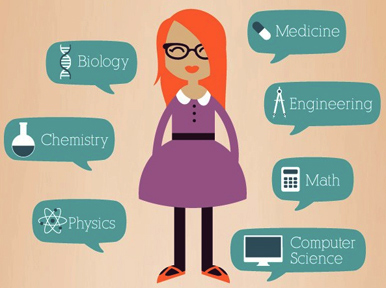|
UNESCO developing new indicators to assess
sex-disaggregated data on women:
Looking for women in science n’ stuff
by Tanya Blowers
UNESCO has just launched a global project targeted at the gender gap
in science, technology, engineering and mathematics subjects, acronymed
STEM. The initiative, known as SAGA (STEM and Gender Advancement), will
address the lack of data on women in STEM - a dearth that restricts the
design and monitoring of policies to address gender equality.
|

Pic socialwayne.com |
By developing new indicators and methods to measure and assess
sex-disaggregated data on women’s participation and the barriers they
face, SAGA hopes to help reduce the gender gap at all levels of
education and research.
The launch comes a few months after a Washington Post article revived
debates about ‘zombie statistics’ on women, agriculture, labour and land
ownership, such as “women produce 60 to 80 per cent of the world’s
food”. Such figures are kept alive by continual referencing in research
papers and interviews on the subject, and are even used as the basis for
funding requests or policy decisions - but, on closer inspection, no one
knows where they come from. Like zombies, this dubious data refuses to
die.
Its persistence points to another major problem: reliable and
meaningful global and comparative figures for women’s participation in
labour markets and agriculture tend to be few and far between.
This is also the case with women in science, technology and
innovation. International organisations have made attempts to amalgamate
the data collected by different countries and regions to produce
sex-disaggregated comparative figures for different places.
SHE figures
For example, the highly respected SHE figures - published every three
years by the European Commission - maps data on women in STEM across
Europe. And the Organization for Women in Science for the Developing
World (OWSD), in partnership with WISAT (Women in Global Science and
Technology), has spent the past few years mapping gender-sensitive data
on important ‘knowledge society’ issues, including science and
technology, in different countries. Assessments on four African
countries - Ethiopia, Kenya, Rwanda and Uganda - took place in 2015.
What is interesting is that both projects attempt to tease out the
social and cultural factors that might affect women’s participation in
sciences, as well as the basic quantitative data about the number of
PhDs and so on.
The SHE figures for 2012 measured new indicators including work-life
balance. [1] And the OWSD/WISAT project uses new indicators of health,
economic and social status to assess the barriers women face.
But, of course, the best outcome would be if countries - especially
developing ones - could collect and provide statistics themselves,
rather than global organisations doing this. If countries gathered
gender-disaggregated statistics and used an agreed set of indicators,
this would make comparisons more straightforward and meaningful.
GenderInSITE
This is where the UNESCO SAGA project could prove transformative. And
there are regional projects to complement this work. Last week,
campaigning organisation GenderInSITE organised a workshop in Zimbabwe
on mapping gender in science, innovation, technology and engineering
policy and governance in Africa.
It brought together many African women and men involved in science
and gender policy, as well as international participants, including
myself, via video conference. One objective was to agree on indicators
for collecting data on gender in nine African countries, as part of the
African Science, Technology and Innovation Indicators programme.
Data collection is, of course, only the start of the story. Data must
be analysed, translated and presented. Then it can provide a solid basis
for demanding change in closing the gender gap and for seeking funding
to do this.
Speed read
There are few reliable figures for women’s participation in science
Countries - especially developing ones - should collect comparable
stats
Data offers solid basis for demanding change and funding
(Tonya Blowers is programme coordinator for the Organization for
Women in Science for the Developing World. Previously she was a staff
writer at TWAS (The World Academy of Sciences) and has developed science
communication courses for PhD students. She can be contacted at [email protected].)
(SciDevNet)
|

